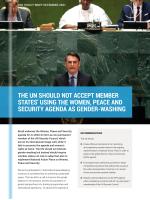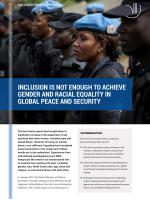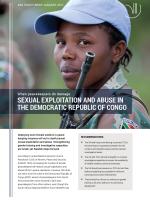The UN should not accept member states’ using the women, peace and security agenda as gender-washing
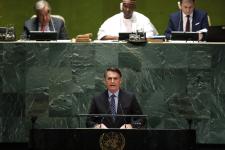
The UN should:
- Create effective mechanisms for monitoring and supporting member states in the ongoing implementation of National Action Plans in order to advance the global Women, Peace and Security (WPS) agenda.
- Encourage troop-contributing countries to adopt comprehensive policies that address the causes of the under-representation of women in its armed forces and promote upward mobility.
- Require national adherence to the WPS agenda when considering countries’ bids for non-permanent membership of the UN Security Council.
Women’s participation in international peacekeeping missions is considered key to achieving sustainable peace. This has led to a call to improve the gender balance in UN missions and the incorporation of gender perspectives into training programmes and international operations. To advance the agenda of ‘Women, Peace, and Security’ (WPS), UN missions partly rely on troop-contributing member states to implement this agenda in their own national contexts. This can include adopting National Action Plans (NAP) on WPS and subsequent initiatives to foster the inclusion of women in the country’s military academies and armed forces. While the adoption of NAPs has advanced across the globe, having been introduced in 98 countries as of September 2021, its implementation is vulnerable to changing political regimes among member states.
This is evident in the case of Brazil, where no governments have shown much interest in implementing the NAP since it was adopted in 2017. This also follows a declining commitment to international peacekeeping. With the current far-right government in power, the NAP’s very existence can be considered an achievement, though its implementation in both domestic and foreign policy affairs is lagging behind. Concomitantly, despite recent setbacks at home, the NAP serves Brazil’s international reputation well.
Peacekeeping as a foreign-policy instrument
Brazil has a long history of participating in peacekeeping missions. From 2004 to 2017 it led the UN Stabilization Mission in Haiti, MINUSTAH, earning itself a reputation at that time as a significant player in the international peace and security system. Brazil was the most influential troop contributor to MINUSTAH, deploying approximately 37,500 troops. The mission was part of a range of multilateral initiatives launched by the centre-left ‘Lula’ government, which had taken office in 2003.
Under Lula’s government, Brazil’s foreign policy was directed towards increasing Brazilian soft power and gaining prestige in the international arena, consolidating the country’s regional leadership position and strengthening its role in South-South development cooperation. The mission in Haiti was also part of a strategic initiative to demonstrate Brazil’s capacity to contribute to global peace and security in its ambition to obtain a permanent seat on the UN Security Council (UNSC). During the MINUSTAH mission, Brazil was elected twice for a non-permanent seat in the UNSC, in 2004-2005 and again in 2010-2011.
In this context, adhering to global gender-equality norms like the WPS agenda has arguably become a prerequisite for countries like Brazil to gain legitimacy and demonstrate a commitment to the UN system and its values by participating in international peacekeeping. For that reason, Brazil has increasingly promoted the WPS agenda internationally because of its association with the UNSC, despite there being little domestic political push for its implementation.
The WPS agenda under far-right governance
Brazil made significant advances in women’s rights, gender equality and the protection of women against violence during the years of the centre-left government (from 2003-2016), including in the realm of defence and foreign policy. The drafting of Brazil’s NAP started in 2015, at a time when Brazil was going through political and economic turmoil that led to the controversial impeachment of President Dilma Rousseff in August 2016. A new government led by Michel Temer brought a conversative right-wing turn in Brazilian politics. New members entered the NAP working group, some of whom associated the NAP with the former government and leftist ideology. Despite the political turbulence, the change of government and ideological divergences within the working group, the leadership of the drafting process managed to preserve the scope of the NAP as an international UNSC agenda, and the NAP was launched on Women’s International Day on 8 March 2017.
Adhering to global gender-equality norms like the WPS agenda has arguably become a prerequisite for countries like Brazil to gain legitimacy and demonstrate a commitment to the UN system and its values.
Brazil’s NAP responded to the UNSC Resolution 1325 on WPS that calls on members states to prevent violence against women and to mainstream a gender perspective into peacebuilding. The NAP states that Brazil is committed to incorporating a gender perspective and ‘promoting the qualified participation of women in international peace and security’.
The NAP was adopted as a ministerial declaration, rather than going through congress to gain legal status. It was not granted any budgetary allocation, nor any binding indicators to measure progress. Furthermore, it focuses only on Brazil’s actions overseas, although it could have addressed critical domestic issues such as Brazil’s high rates of gender-based violence and homicide, as well as the impact of the country’s pervasive urban and armed violence on women. Although these issues were on the table during the drafting process, they were left out of the final plan.
Since the NAP was adopted little has been done to implement it, and it has received little attention from the public. Because the NAP does not address domestic issues that are pertinent to Brazil’s women’s movements, the WPS agenda has not been taken on by the movements. Moreover, the international WPS agenda is situated in the realm of defence, a realm that is not easily reconciled with civil society due to Brazil’s history of military dictatorship and lack of transitional justice.
When Temer’s government took office, it introduced major changes in policy agendas, ministerial organization and made massive budget cuts in social programmes, resulting in setbacks for women’s rights and gender equality in Brazil. It also caused major shifts to Brazil’s foreign policy, away from South-South cooperation, multilateralism and engagement in international peace and security. These setbacks and reorientations of Brazil’s foreign policy continued after the presidential elections in 2018, which brought a far-right government to power. The new government’s neoconservative ideology embraces an anti-feminist agenda, as well as policies against women’s rights, and has waged a self-proclaimed ‘cultural war’ on social movements, education, so-called ‘gender ideology’, cultural production and journalism. The Bolsonaro government advocates its ideology in multilateral forums such as the UN, particularly in the arena of sexual and reproductive health and rights, an important battlefield among conservative political forces across the globe.
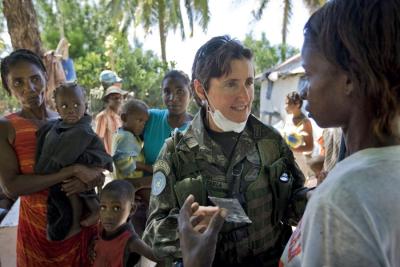
Despite the far right’s rise to power, the leadership of the NAP working group secured its renewal in March 2019 for another four years. Among the reasons for this were Brazil’s bid for a non-permanent seat in the UNCS from 2022-2023, in which the ‘Advancement of the Women, Peace and Security Agenda’ was stated to be one of Brazil’s priorities. Brazil’s bid was successful.
The future of Brazilian female peacekeepers
In 2019 and 2020, Brazilian female peacekeepers were awarded the United Nations Military Gender Advocate of the Year Award for their contribution to promoting the principles of the UN Security Resolution 1325. They served as the military Gender and Protection Advisors in the peacekeeping mission in the Central African Republic (MINUSCA). The awards fostered recognition among Brazilian military and defence circles. This might encourage Brazil to commit to the WPS agenda in peacekeeping missions and at home where action is required to promote women’s full participation in its armed forces and address the current barriers to the uptake of women in its military academies. It was not until 2012 that a presidential decree urged the country’s military academies to accept women.
The limited participation of women deployed on peace operations reflects the low uptake of women in the country’s armed forces and the absence of Brazilian women from combat positions. The army is the branch of the military with the lowest female representation, most of whom are low-ranking officers and serve in administrative and medical positions. Only 140 women served in the mission to Haiti (MINUSTAH), most of them dentists, nurses, translators and engineers. The few female officers who did participate in patrols experienced being watched and judged by their male counterparts and held to a different standard than male officers. These experiences echo scholarly critiques of the ‘added burden’ of unrealistic expectations being placed on female peacekeepers, which risk reinforcing gendered stereotypes.
Since MINUSTAH, Brazil has scaled down its contribution to peacekeeping for various reasons, including the changing nature of UN missions, characterised by increased insecurity and militarisation of mission mandates. Combined with the reorientation of Brazil’s foreign policy and its stance on women’s rights, the NAP continues to have little impact.
Renewal of the NAP in 2023
For the UN to advance its goals of the WPS agenda, these goals need to be put into effect by member states that contribute troops to peacekeeping missions. To achieve more gender equality in the missions is an example of how troop-contributing countries need to address the causes of under-representation of women in their armed forces, promote upward mobility of female officers and provide adequate training in order for the composition and culture of the troops to change.
For the WPS to have an effect domestically and internationally therefore requires substantial changes to the mechanisms through which gender norms are pushed. If member states like Brazil endorse the WPS agenda in international forums but omit to implement the agenda and women’s rights at home, this points to the current limitations of the National Action Plans, and of non-binding agreements more generally, that risk becoming a tool not for action but for gender-washing. It also shows the vulnerability of NAPs in national contexts of changing governments whose agendas may provide both progress and setbacks over time.
In the case of Brazil, its membership of the UNSC from 2022-2023 is likely to ensure the renewal of the NAP in 2023, regardless of the outcome of the presidential election in October 2022. However, whether Brazil will maintain the status quo in practice, or start to make progress in implementing the NAP, is likely to depend on the post-election political climate.
DIIS Experts

